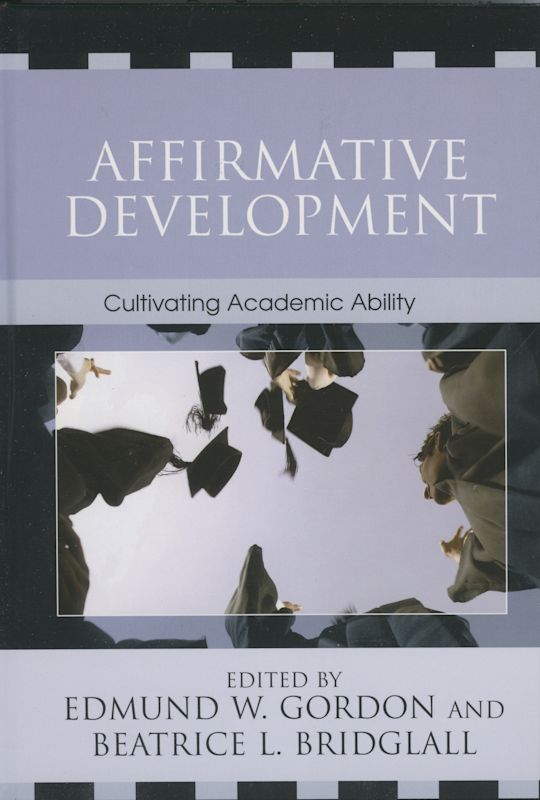- Home
- ACADEMIC
- Education
- Psychology and Education
- Affirmative Development
Affirmative Development
Cultivating Academic Ability
Edmund W. Gordon (Author) , Beatrice L. Bridglall (Author) , Joshua A. Aronson (Contributor) , Albert Bennett (Contributor) , Ana Marie Cauce (Contributor) , Howard T. Everson (Contributor) , Elena L. Grigorenko (Contributor) , James G. Greeno (Contributor) , Carol D. Lee (Contributor) , Rodolfo Mendoza-Denton (Contributor) , Aundra Saa Meroe (Contributor) , Joseph S. Renzulli (Contributor) , Judy K. Stewart (Contributor)
- Textbook
Affirmative Development
Cultivating Academic Ability
Edmund W. Gordon (Author) , Beatrice L. Bridglall (Author) , Joshua A. Aronson (Contributor) , Albert Bennett (Contributor) , Ana Marie Cauce (Contributor) , Howard T. Everson (Contributor) , Elena L. Grigorenko (Contributor) , James G. Greeno (Contributor) , Carol D. Lee (Contributor) , Rodolfo Mendoza-Denton (Contributor) , Aundra Saa Meroe (Contributor) , Joseph S. Renzulli (Contributor) , Judy K. Stewart (Contributor)
- Textbook
Buy from Bloomsbury eTextBooks
You are now leaving the Bloomsbury Publishing website. Your eBook purchase will be with our partner https://www.vitalsource.com.
Your credit card statement will show this purchase originating from VitalSource Technologies. They will also provide any technical assistance you might require.
You must sign in to add this item to your wishlist. Please sign in or create an account
Description
According to Gordon and Bridglall, the ability to learn is more of a developed human capacity than a fixed aptitude with which one is born. They argue that the emergence of academic ability is associated with exposure to specialized cultures that privilege the attitudes, knowledge, and skills that schools reward. Children who are born to and raised in these cultures tend to do well in school, while those who are not exposed to such cultures tend seldom rise to high levels of academic achievement. Through a collection of interesting essays, Affirmative Development: Cultivating Academic Ability attempts to address how we can deliberately develop academic ability in those children who are not raised under conditions that predispose them to develop high levels of academic ability.
Table of Contents
Chapter 2 Toward the Development of Intellective Character
Chapter 2 Intellective Competence: The Universal Currency in Technologically Advanced Societies
Chapter 3 Intelligence as a Socialized Phenomenon
Chapter 4 Affirmative Development as an Alternative to Affirmative Action
Chapter 5 Meritocracy and the Opportunity to Learn
Chapter 6 Cultural Experience, Academic Cultures and Academic Ability
Part 7 Part II: Affirmative Development of Academic Ability
Chapter 8 The Curriculum and Its Functions
Chapter 9 The Teaching and Learning of Intellective Competence
Chapter 10 Psychosocial Processes in the Cultivation of Intellective Competence: The Interpenetration of Affective, Cognitive, and Situative Processes in Intellective Behavior
Chapter 11 Politicalization: A Neglected Pedagogical Process
Chapter 12 The Problem of Transfer and Adaptability: Applying the Learning Sciences to the Challenge of the Acheivement Gap
Chapter 14 Task Force Report on the Affirmative Development of Academic Ability: All Students Reaching the Top: Strategies for Closing Academic Achievement Gaps
Product details
| Published | 20 Dec 2006 |
|---|---|
| Format | Ebook (Epub & Mobi) |
| Edition | 1st |
| Extent | 310 |
| ISBN | 9780742569485 |
| Imprint | Rowman & Littlefield |
| Series | Critical Issues in Contemporary American Education Series |
| Publisher | Bloomsbury Publishing |
About the contributors
Reviews
-
This collection of readings builds on constructivist and critical literacy theories to advocate not only for 'equal opportunities' and 'affirmative action,' but for gathering together all the cognitive, social, cultural, and psychological forces of society as a whole to empower children to reach their fullest academic potential. Recommended.
Choice Reviews
-
This set of essays provides a bold vision of the many forms of human capital that any society-particularly one with abundant resources-ought to develop in its children and youth. It is a necessary handbook for educators, social workers, health professionals-anyone committed to the development and wellbeing of all young people.
Dennie Palmer Wolf, Brown University
-
The development of human capacity for all, but especially for minority students, is at the core of this important book. Based on Gordon's longstanding commitment to equity and social justice and the role of education in this endeavor, this volume presents the seminal thinking of Gordon and Bridglall around the concept of Affirmative Development. Because of its original conceptualization, its richness in historical and sociopsychological details, and the practicality of the recommendations, this book is a must read for all educators interested in educational equity and in the development of academic abilities of minorities and those who are low on wealth.
Ofelia García, Columbia University



































